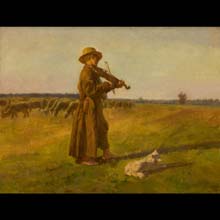
material: oil on canvas
dimensions: 96 × 125 cm
description: The picture of the countryside in Chełmoński’s works reflects his friendly, honest attitude to peasants and their life. Like many other artists of the time, the painter was fascinated by the villagers’ attachment to their homeland, the observance of old customs, simplicity of their manner, as well as – despite humble living conditions – strength and unusual vitality. In Chełmoński’s works, peasants were usually portrayed in a realistic and even quite a crude way, sometimes verging on naturalism. The artist’s mature works were characterized by lyrical treatment, focussing on the nostalgic vision of the countryside. This slightly sentimental world was often inhabited by children, usually shepherds. This painting is marked by the simplicity and poetic mood of representation. In the centre on the composition, there is a barefoot boy in a plain old coat, playing the violin. He is accompanied by a mongrel and a flock of sheep. On the horizon, the landscape is enclosed by a strip of the forest visible in the distance. The drowsy atmosphere of this summer day is accentuated by the use of light colours, as if bleached by the sun. The painting reminds of the novella by Henyk Sienkiewicz entitled "Janko Muzykant" Janko, the Musician]. Aleksandra Krypczyk
exposition: The Gallery of 19th Century Polish Art in Sukiennice,
The Cloth Hall, 1, Main Market Square
key: Realism, polish impressionism, beginnings of symbolism >>>
dimensions: 96 × 125 cm
description: The picture of the countryside in Chełmoński’s works reflects his friendly, honest attitude to peasants and their life. Like many other artists of the time, the painter was fascinated by the villagers’ attachment to their homeland, the observance of old customs, simplicity of their manner, as well as – despite humble living conditions – strength and unusual vitality. In Chełmoński’s works, peasants were usually portrayed in a realistic and even quite a crude way, sometimes verging on naturalism. The artist’s mature works were characterized by lyrical treatment, focussing on the nostalgic vision of the countryside. This slightly sentimental world was often inhabited by children, usually shepherds. This painting is marked by the simplicity and poetic mood of representation. In the centre on the composition, there is a barefoot boy in a plain old coat, playing the violin. He is accompanied by a mongrel and a flock of sheep. On the horizon, the landscape is enclosed by a strip of the forest visible in the distance. The drowsy atmosphere of this summer day is accentuated by the use of light colours, as if bleached by the sun. The painting reminds of the novella by Henyk Sienkiewicz entitled "Janko Muzykant" Janko, the Musician]. Aleksandra Krypczyk
exposition: The Gallery of 19th Century Polish Art in Sukiennice,
The Cloth Hall, 1, Main Market Square
key: Realism, polish impressionism, beginnings of symbolism >>>












